On the outside looking in, it may seem like a highly privileged and indulgent life. Most often, people are fooled by appearances as well as the countless Hollywood clichés that describe the diplomatic world. One thing is clear though: it was and partly still is a man’s world.
Social roles in the diplomatic world are still strongly gendered and built on hundreds of years of customs and stereotypes. For a long time, men have been the diplomats and women ‘just’ the spouses. The often rigid and highly hierarchical diplomatic life only reflected the traditional social norms of the times. Thus, women were simply excluded from the diplomatic corps and when employed by the Foreign Offices, worked in lower positions and in administrative posts such as stenographers, clerks, secretaries or interpreters.
But times are changing and consequently, also the diplomatic realities. The Frenchwoman Suzanne Borel (Bidault, after she married) and the Russian Alexandra Kollontai were among the first women to become diplomats in Europe at the beginning of the 20th century. Nowadays, I am pleased to say that women have increasingly free access to diplomatic jobs, and the famous ‘glass ceiling’ seems to have finally been broken in this particular field. Madeleine Albright (the first female US Secretary of State) once said: “Societies are better off when women are politically and economically empowered”.

However, women throughout the world still remain greatly underrepresented and undervalued in the decision-making and political fields. The European Union, although considered a global leader in this field, is not much different.
Even though gender equality is a founding principle and part of the EU’s Charter of Fundamental Rights, in 2021 only three out of the 27 Foreign Ministers are women.
In the meantime, it should be mentioned that the Foreign Minister of the EU, formally known as the High Representative of the Union for Foreign Affairs and Security Policy, a position currently held by Josep Borell, was previously held by two women, Catherine Ashton (2009-2014) and Federica Mogherini (2014-2019).
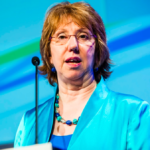
The index for political power is on average around 55 in the EU, with Sweden topping the list with a score of 95.1 out of 100. Also, when it comes to the foreign ministry, Sweden’s ratio is quite impressive. Out of the total number of MFA employees, 836 are women and 577 are men, with an equal ratio of male and female ambassadors. Other countries in Europe have also taken huge steps towards gender equality in the diplomatic field. Just to mention a few examples, Romania has 50% women in key managerial positions within the ministry and 36% of the current appointed ambassadors are women (only last year, 22 women were officially proposed for an ambassadorial position), Slovakia has a ratio of 51.5% women in its Foreign Office, and 49.1% women posted abroad.
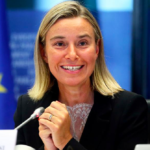
Germany has registered more than 50% women among the new employees in 2019 and developed a new and innovative job-sharing model. Since 2017, the German Consulate in Montreal has been the first German mission abroad whose leadership follows this model, where a married couple, Dr. Markus Lang and Dr. Kathrin Misera-Lang, alternate the role of Consul General every six months, in order to better harmonize their professional and personal lives abroad.
There is also a shared ambassadorship model in Ljubljana, the capital of Slovenia, where two German diplomats alternate ambassadorial duties every eight months for a period of four years.

But there are many other European countries still struggling to raise the level of women participation; they still have a long way to go.
Having said that, another question should be raised: with the changing times and realities, how do the diplomatic spouses fit in and how is this group evolving?
Along with the countless stereotypes related to diplomats, their spouses have always been depicted as traditional housewives, the epitome of elegance and grace, raising perfect children and being the perfect hosts, permanently in charge of etiquette and protocol.
Over time, literature has tried to uncover some of the fairy tale mystery surrounding diplomatic spouses. Books like Brigid Keenan’s ‘Diplomatic baggage’ (2006), ‘Diplomatic incidents’ (2010) by Cherry Denman or more recently, my own book of memoirs ‘Just a diplomatic spouse’ (2020), all try to present more realistically and with genuine feelings, the everyday life behind the ‘fancy curtains’, and the loneliness and the struggles that come with it.
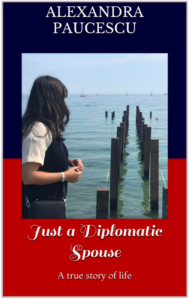

As we move forward, realities are also changing. Diplomatic partners are increasingly reluctant to give up their jobs and independence and move abroad on diplomatic missions. Women and men don’t want to be perceived as merely the trailing spouses any longer and are increasingly concerned about their future. They wish to maintain their level of relevance to the professional field and need to have a sense of purpose and a meaningful contribution to society. Losing one’s independence is not easy; I recall my own feelings when I first moved abroad with my diplomatic husband and received my first diplomatic ID. There, my name was immediately followed by the description : ‘Wife of…’, proof of my ‘dependency’ status.
While more and more women are working in the diplomatic field, the number of male diplomatic spouses is increasing significantly, despite the fact that men are even more reluctant to give up their independence and embrace the role of supporting their wives’ career abroad. The traditional role division, with the men as ‘providers’ and women as ‘expressive’, dealing with children and family matters, was mentioned in 1955 in the ‘Family socialization and interaction process’ by Talcott Parsons and Robert Bales. “Family structure will attain long term stability through universal ‘modern’ reconfiguration which incorporates a nuclear family structure and gender role specialization.”

Parsons used family norms to define the ‘ideal’ family and praised the benefits of gender role specialization, implying that it would create spousal interdependence and thus marital stability. Today, this is no longer the case. Although men still earn more money for similar jobs and are promoted more readily, the model of ‘dual-income’ families is considered the most acceptable. And so, when moving abroad, there is always the problem of keeping a job or finding a new one for the spouse.
Most diplomatic spouses are highly trained and are university graduates, but due to various reasons, find it impossible to perform professionally while abroad. Some countries don’t have bilateral work agreements, others impose restrictions on their own diplomats, or in some cases the diplomatic partners are over-qualified for the jobs that they manage to find. The gap years mentioned in the resumés and the work experience in different and sometimes unrelated fields are not helpful either. Some try professional reconversions, other use the 21st century online platforms and opportunities for working remotely. The most common options are still employment by the national MFAs or working as embassy staff. Employment is important not only for financial security and independence, but also for maintaining mental health and self-esteem.
Keeping a day job is often more important to men than to women. That is perhaps one of the reasons why not all men decide to follow their diplomatic wives abroad; most women ambassadors are unaccompanied by their spouses. Family life is seriously affected in some cases, not to mention the long office hours or the frequent relocations to possibly less attractive diplomatic postings.
Foreign Offices should also pay more attention to the needs and struggles of family members. Although the most common approach is to ignore the issues and leave diplomatic families to deal with them on their own, some countries recognize the toll which this nomadic life takes on all concerned and have implemented effective policies designed to minimize the challenges and the impact on their lifestyle. They successfully offer some kind of protection and support. Some EU countries provide pension contributions for diplomatic spouses abroad when not working. Others set a priority on employing diplomatic spouses for available positions within the embassies and offer additional allowances for spouses on postings. There are also employment contracts for ambassador’s wives as a recognition of their contribution, and health insurance covers abroad and at home among other initiatives. Some countries also assure the right to return to a former job, when that is in public office.
The European Union Foreign Affairs Spouses, Partners and Families Association (EUFASA) is a network that tries to bring together the diplomatic spouses associations in Europe and support their causes at a European level. In 2019, EUFASA conducted a survey on diplomatic partnership with the participation of 1,235 diplomatic spouses (males and females), which proved once again the importance and the need for supportive and coordinated measures. According to the survey, 30% of all respondents tried or considered seeking counselling due to the constant pressure, loneliness, career failure and loss of meaning and purpose.
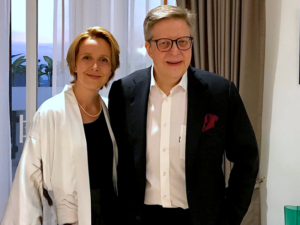
The survey also showed that 40% of diplomats would leave the foreign office if their jobs were to have a negative effect on their families, with more men affirming that their wives would do so.
The EUFASA survey showed the need for regular career coaching and training, a partner pension system , partner financial and emotional support and assistance.
In an interview with Olga Tapiola, herself a diplomatic spouse, wife of current EU ambassador to Thailand, she emphasized the need for support. As a psychologist, she recognized the struggles that spouses face and the additional pressure that male spouses feel while at postings.
Phil McAuliffe (who served two postings as diplomat and two as an accompanying spouse) says on his blog : “Males have a strong part of their identity tied into their work life. Role reversal can be difficult (…), patience is needed to adjust to new roles and a new environment, it doesn’t happen overnight”.
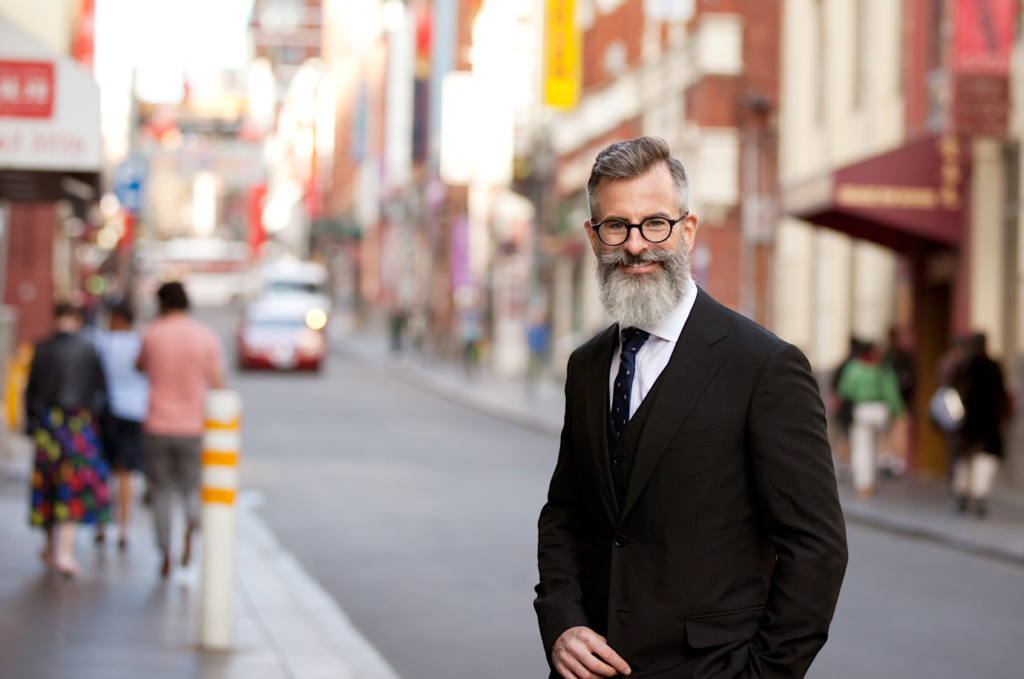
Traditional role expectations make the experience of being a diplomatic male spouse different and more demanding than for women in a society which can, at times, be judgmental.
Anne M. Brasely, in her doctoral dissertation about trailing spouses, based on 8 months of research and interviews in Kuala Lumpur and Brussels, noted that gender matters significantly, particularly along “two axes: gendered structures in society and gendered social expectation”.
It is also important to acknowledge the difference in cross-cultural integration between the working diplomat and the spouse, who has less social and work contacts. Thus the integration of the spouse is more likely to be tedious and not always successful.
Nowadays, there are numerous support groups, mostly online, for expat spouses who live a similar kind of life and therefore have a deeper understanding and sympathy for each other. Expat career coaches, businesses based on relocation services, advisors, intercultural trainers, these are all more recent jobs associated with the nomadic lifestyle to which the diplomatic spouses belong, irrespective of gender.
However, for male spouses this is somehow more difficult. This is because male spouses often lack the supportive network and expat group activities traditionally associated with women and initially designed for them.
Tomohiro Harada, spouse of a Norwegian diplomat now posted in Chile, told me : “Most often, we are invisible. People don’t know that male spouses exist. The diplomatic community is decentralised and I am mostly dependent on my wife’s network to provide social connections”. Although he is now working remotely, he thinks that it will be probably difficult to find a job once they return home.
In different diplomatic spouses associations, although the numbers are slightly changing, on average there are about 75% women and only 25% men. But in some cases, men are even less present. For example, according to Milena Guarino Padula, Board Member of the Italian Ministry of Foreign Affairs Spouses Association (ACDMAE) and the Italian Delegate for EUFASA in Italy, out of around 300 members of the ACDMAE, only 3 are men.
In 2020, Cécile Atta-Van Peteghem, a Belgian diplomatic spouse hit upon the idea of creating a private Facebook group called ‘The Diplomatic Spouses Association Worldwide’ (DSAW). It aims to reunite diplomatic spouses from all over the globe and to provide support and a meeting platform for all these people. Out of its 4505 members, only 5% are men. Again, the male presence is exceptionally low.
So, what can be done? I think that the 21st century should finally be the century of acceptance, equality, tolerance and integration. People are equal, irrespective of race, colour or gender. Diplomacy must make even greater strides towards these goals and needs to ensure that its diplomats and their spouses feel fully accomplished, are equally heard, supported and integrated. Diplomatic spouses associations must recognize and encourage male spouses to also participate in their programmes. They should also design their activities in a more gender-neutral manner, in order to incentivize male spouses to participate as well. The time of the traditional ‘knitting club’ is long gone. Men should also become more willing to participate and be ‘seen’ in such structures. There is no shame in being part of a spouses association; it makes one no less relevant or capable and it could even prove quite beneficial for one’s mental well-being.
Meanwhile, foreign ministries should accept that volunteer representational spouse work should be more valued and that people, irrespective of gender, need recognition and support in order to feel secure and satisfied with their nomadic diplomatic life.
We are all different but we are in this together.
“Diplomacy is like jazz: endless variations on a theme.” (Richard Holbrooke, former United States Ambassador to the United Nations)

